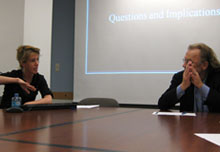Event
Global influence on local elections is increasing, says Teachout

May 6, 2009 — Zephyr Teachout, visiting assistant professor of law at Duke University, spoke at the Shorenstein Center about the crumbling barriers to the globalization of electioneering.
Teachout began her talk, “The Future of ‘Internet Campaigning’: The Globalization of Local Elections,” by looking at the barriers that until recently have limited foreign influence in local campaigns.
The first, Teachout said, is “lack of interest or stake” in local elections; this barrier is diminishing due to increasing globalization. “Lack of knowledge and monitoring capacity,” she continued, was once an obstacle but is changing with the increased ability to monitor political activities through the Internet.
Another change on the horizon of local campaigns are laws against foreign electioneering, Teachout said. Issue advertisements and media loophole enforcement problems are helping to lower those barriers, said Teachout. Finally, she said that the expense of long-distance electioneering is becoming less of an obstacle through “targeted mobilizations and persuasion campaigns … and ‘unmediated’ media campaigns.”
Local campaigns have also been influenced by the “media exception,” which Teachout described as the ability of the media to editorialize and influence shifts in politics. She cited examples of Israeli and Indian newspapers editorializing about the American presidential candidates. “These are early signs of what is going to be a global phenomenon,” said Teachout.
The reaction to increased globalization in local elections has been diverse: optimism in the ability of foreign voices to be heard in American politics, and fear that this will bring a “radical erosion of self-government,” she said. Teachout herself is “troubled by the implications” of global influence. “This is a reason we ought to be — not for economic but for democratic reasons — wary of the degree of globalization that we have,” she said.
This article was written by Janell Sims and the photos taken by Leighton Walter Kille, both of the Shorenstein Center.